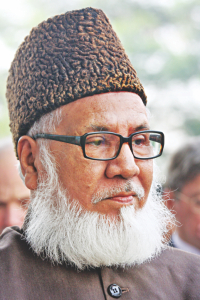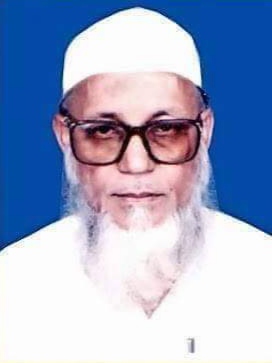Related Research Articles

Jamaat-e-IslamiPakistan, commonly known as Jamaat, is an Islamist political party based in Pakistan and founded by Abul Ala Maududi. It is the Pakistani successor to Jamaat-e-Islami, which was founded in colonial India in 1941. Its objective is the transformation of Pakistan into an Islamic state, governed by Sharia law, through a gradual legal and political process. JI strongly opposes capitalism, communism, liberalism, and secularism as well as economic practices such as offering bank interest. JI is a "vanguard party", whose members are intended to be leaders spreading party beliefs and influence. Supporters not thought qualified to be members may become "affiliates", and beneath them are "sympathizers". The party leader is called an "ameer". Although it does not have a large popular following, the party is quite influential and considered one of the major Islamic movements in Pakistan, along with Deobandi and Barelvi.

The Independence of Bangladesh was declared on 26 March 1971, celebrated as Independence Day, from Pakistan. The Independence Day of Bangladesh is celebrated on 26 March when Sheikh Mujibur Rahman declared the independence of Bangladesh. The Bangladesh Liberation War started on 26 March and lasted till 16 December 1971 which is celebrated as Victory Day in Bangladesh. There is a dispute along partisan line regarding who declared the independence of Bangladesh. The Awami League claim Sheikh Mujibur Rahman while the Bangladesh Nationalist Party claim it was Ziaur Rahman.

Ghulam Azam was a Bangladeshi Islamist politician and a war criminal. He was the former leader of Bangladesh Jamaat-e-Islami, the oldest and the largest Islamic political party in Bangladesh.
Delwar Hossain Sayeedi was a Bangladeshi Islamist leader, politician, public speaker, and convicted war criminal, who served as a Member of Parliament representing the Pirojpur-1 constituency from 1996 to 2006.

Motiur Rahman Nizami was a politician, former Minister of Bangladesh, Islamic scholar, writer, and the former leader of the Bangladesh Jamaat-e-Islami. He is noted for leading the terror squad Al-Badr during the Bangladesh Liberation War. On 29 October 2014, he was convicted of masterminding the Demra massacre by the International Crimes Tribunal of Bangladesh. Nizami was the Member of Parliament for the Pabna-1 constituency from 1991 to 1996 and again from 2001 to 2006. He also served as the Bangladeshi Minister of Agriculture and Minister of Industry.
The Razakar was an East Pakistani paramilitary force organised by General Tikka Khan in then East Pakistan, now called Bangladesh, during the Bangladesh Liberation War in 1971.
The Al-Badr was a paramilitary force composed mainly of Bihari Muslims which operated in East Pakistan against the Bengali nationalist movement during the Bangladesh Liberation War, under the patronage of the Pakistani government.

General elections were held in Pakistan on 7 December 1970 to elect members of the National Assembly. They were the first direct general elections since the independence of Pakistan and ultimately the only ones held prior to the independence of Bangladesh. Voting took place in 300 general constituencies, of which 162 were in East Pakistan and 138 in West Pakistan. A further thirteen seats were reserved for women, who were to be elected by members of the National Assembly.

Ali Ahsan Mohammad Mojaheed was a Bangladeshi politician who served as a Member of Parliament and as the Minister of Social Welfare from 2001 to 2007. He was executed in 2015 for war crimes committed during the 1971 Liberation war of Bangladesh.
East Pakistan Central Peace Committee, also known as the Nagorik Shanti Committee, or more commonly Peace Committee or Shanti Committee, was one of several committees formed in East Pakistan in 1971 by the Pakistan Army to aid its efforts in crushing the struggle for Bangladesh's liberation. Nurul Amin, as a leader of Pakistan Democratic Party, led the formation of the Shanti Committee to thwart the Mukti Bahini, Which fought for the liberation of Bangladesh. Bangladesh Genocide Remembrance Day is held in the memory of victims of 1971 Bangladesh genocide and massacre by Pakistan Army and organisations created and abetted by Pakistan Army such as Razakars and so-called "East Pakistan Central Peace Committee".

Shahriyar Kabir is a Bangladesh journalist, filmmaker, human rights activist, and author of more than 70 books focusing on human rights, communism, fundamentalism, history, and the Bangladesh war of independence. He was awarded Bangla Academy Literary Award in 1995.

The independence of Bangladesh was declared on 26 March 1971, at the onset of the Bangladesh Liberation War by Bangabandhu Sheikh Mujibur Rahman; the following day the declaration was broadcast by Major Ziaur Rahman from Swadhin Bangla Betar Kendra radio station in Kalurghat, Chattogram. On 10 April, the Provisional Government of Bangladesh issued a proclamation on the basis of the previous declaration and established an interim constitution for the independence movement.

Bangladesh Jamaat-e-Islami, previously known as Jamaat-e-Islami Bangladesh, is a major Islamist political party in Bangladesh.

The Nizam-e-Islam Party or simply Nizam-e-Islam, is a religious-political party in Bangladesh and Pakistan. The party was founded in the city of Kishoreganj in 1952, by the Islamic scholars of erstwhile East Bengal, Pakistan as an offshoot of the Jamiat Ulema-e-Islam. It was one of the four political parties belonging to the United Front alliance which defeated the Muslim League in the 1954 elections.
The Bangladesh Collaborators Order, 1972 is a law enacted in 1972 by the Government of Bangladesh to establish a tribunal to prosecute local collaborators who helped or supported the Pakistan Army during the Bangladesh Liberation War and the 1971 Bangladesh genocide. An estimated 11,000 collaborators were arrested. An estimated 2,884 cases were filed at the tribunal until October 1973. Of those accused, 752 received sentencing. Many detainees were released after the 15 August 1975 Bangladeshi coup d'état.

The movement demanding trial of war criminals is a protest movement in Bangladesh, from 1972 to present demanding trial of the perpetrators of 1971 Bangladesh genocide during the Bangladesh Liberation War from Pakistan.
Maulana Abul Kalam Muhammad Yusuf was a Bangladeshi religious scholar, writer, activist and politician. Yusuf was a specialist in the study of Hadith : he earned the title "Mumtaz al-Muhaddethin" for his advanced degree in hadith sciences, and has also published books widely in the field.

Muhiuddin Khan was an Islamic scholar from Bangladesh and editor of Monthly Madina. Khan was also a Quranic commentator, journalist, poet, writer and translator. He translated for the first time tafseer Maariful Quran into Bengali.

Jamiat Ulema-e-Islam Bangladesh is a Bangladeshi Islamist Party registered with Bangladesh Election Commission. Jamiat Ulema-e-Islam Bangladesh was a member of the Islamist 20-Party alliance. It was a member of Islami Oikya Jote and which it left in 2008.

Shamsuddin Qasemi was a Bangladeshi Islamic scholar, politician, author and educationist. He was the founding president of the Khatme Nabuwwat Andolan Council, former secretary-general of Jamiat Ulema-e-Islam Bangladesh, former principal of Jamia Madania Chittagong and Jamia Hussainia Arzabad, and the founding chief-editor of the monthly Paygam-e-Haqq and weekly Jamiat magazines. He is also noted for his contributions during the Bangladesh Liberation War of 1971.
References
- ↑ Sekender, Md. Abu Saleh (2020-12-20). "ইসলাম প্রতিষ্ঠায় মুক্তিযুদ্ধ!". Bangla Tribune (in Bengali). Retrieved 2023-02-26.
- ↑ Kasru, Ataur Rahman (2019). "মুক্তিযুদ্ধ ও ইসলাম". Kaler Kantho (in Bengali). Retrieved 2023-02-26.
- ↑ Khalid Hossain, AFM (2020). "মুক্তিযুদ্ধের চেতনা ও ইসলামী মূল্যবোধ". Daily Naya Diganta (in Bengali). Retrieved 2023-02-26.
- ↑ Islam, Sayedul. "যেভাবে জন্ম হয়েছিল আওয়ামী লীগের". BBC News (in Bengali). Retrieved 2023-02-26.
- ↑ Umar, Badruddin (1970). পূর্ব বাঙলার ভাষা আন্দোলন ও তৎকালীন রাজনীতি (in Bengali). Calcutta, India: Anandhara Publications. p. 262. Archived from the original on 2022-09-04.
- 1 2 3 4 Bhaṭṭācārya, Pinākī (2017). Muktiyuddhera bayāne Isalāma (in Bengali) (Tr̥tīya saṃskaraṇa ed.). Ḍhākā. pp. 34, 36, 46. ISBN 978-984-92959-7-6. OCLC 1037898639.
{{cite book}}: CS1 maint: location missing publisher (link) - ↑ Shakil, Salman Tariq (2016-12-15). "যেমন আছেন আলেম মুক্তিযোদ্ধারা". Bangla Tribune (in Bengali). Retrieved 2023-02-26.